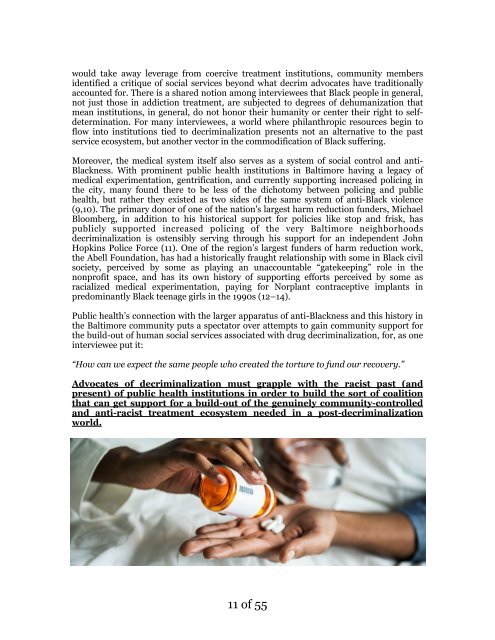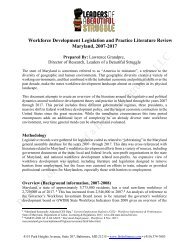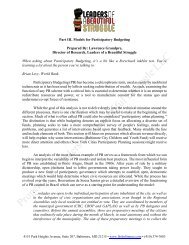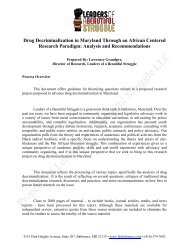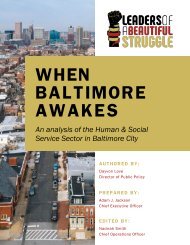The Communal Impacts of Drug Criminalization in Maryland
This project attempts to reframe the harms of drug criminalization. Influenced by African-Centered Research Methodologies, we engaged in a literature review and qualitative research of the communal impacts of drug decriminalization in Maryland, with a specific focus on Baltimore.
This project attempts to reframe the harms of drug criminalization. Influenced by African-Centered Research Methodologies, we engaged in a literature review and qualitative research of the communal impacts of drug decriminalization in Maryland, with a specific focus on Baltimore.
You also want an ePaper? Increase the reach of your titles
YUMPU automatically turns print PDFs into web optimized ePapers that Google loves.
would take away leverage from coercive treatment <strong>in</strong>stitutions, community members<br />
identified a critique <strong>of</strong> social services beyond what decrim advocates have traditionally<br />
accounted for. <strong>The</strong>re is a shared notion among <strong>in</strong>terviewees that Black people <strong>in</strong> general,<br />
not just those <strong>in</strong> addiction treatment, are subjected to degrees <strong>of</strong> dehumanization that<br />
mean <strong>in</strong>stitutions, <strong>in</strong> general, do not honor their humanity or center their right to selfdeterm<strong>in</strong>ation.<br />
For many <strong>in</strong>terviewees, a world where philanthropic resources beg<strong>in</strong> to<br />
flow <strong>in</strong>to <strong>in</strong>stitutions tied to decrim<strong>in</strong>alization presents not an alternative to the past<br />
service ecosystem, but another vector <strong>in</strong> the commodification <strong>of</strong> Black suffer<strong>in</strong>g.<br />
Moreover, the medical system itself also serves as a system <strong>of</strong> social control and anti-<br />
Blackness. With prom<strong>in</strong>ent public health <strong>in</strong>stitutions <strong>in</strong> Baltimore hav<strong>in</strong>g a legacy <strong>of</strong><br />
medical experimentation, gentrification, and currently support<strong>in</strong>g <strong>in</strong>creased polic<strong>in</strong>g <strong>in</strong><br />
the city, many found there to be less <strong>of</strong> the dichotomy between polic<strong>in</strong>g and public<br />
health, but rather they existed as two sides <strong>of</strong> the same system <strong>of</strong> anti-Black violence<br />
(9,10). <strong>The</strong> primary donor <strong>of</strong> one <strong>of</strong> the nation's largest harm reduction funders, Michael<br />
Bloomberg, <strong>in</strong> addition to his historical support for policies like stop and frisk, has<br />
publicly supported <strong>in</strong>creased polic<strong>in</strong>g <strong>of</strong> the very Baltimore neighborhoods<br />
decrim<strong>in</strong>alization is ostensibly serv<strong>in</strong>g through his support for an <strong>in</strong>dependent John<br />
Hopk<strong>in</strong>s Police Force (11). One <strong>of</strong> the region’s largest funders <strong>of</strong> harm reduction work,<br />
the Abell Foundation, has had a historically fraught relationship with some <strong>in</strong> Black civil<br />
society, perceived by some as play<strong>in</strong>g an unaccountable “gatekeep<strong>in</strong>g” role <strong>in</strong> the<br />
nonpr<strong>of</strong>it space, and has its own history <strong>of</strong> support<strong>in</strong>g efforts perceived by some as<br />
racialized medical experimentation, pay<strong>in</strong>g for Norplant contraceptive implants <strong>in</strong><br />
predom<strong>in</strong>antly Black teenage girls <strong>in</strong> the 1990s (12–14).<br />
Public health’s connection with the larger apparatus <strong>of</strong> anti-Blackness and this history <strong>in</strong><br />
the Baltimore community puts a spectator over attempts to ga<strong>in</strong> community support for<br />
the build-out <strong>of</strong> human social services associated with drug decrim<strong>in</strong>alization, for, as one<br />
<strong>in</strong>terviewee put it:<br />
“How can we expect the same people who created the torture to fund our recovery.”<br />
Advocates <strong>of</strong> decrim<strong>in</strong>alization must grapple with the racist past (and<br />
present) <strong>of</strong> public health <strong>in</strong>stitutions <strong>in</strong> order to build the sort <strong>of</strong> coalition<br />
that can get support for a build-out <strong>of</strong> the genu<strong>in</strong>ely community-controlled<br />
and anti-racist treatment ecosystem needed <strong>in</strong> a post-decrim<strong>in</strong>alization<br />
world.<br />
11 <strong>of</strong> 55


